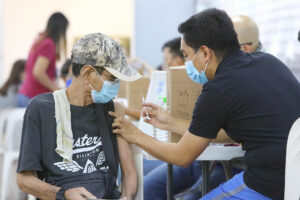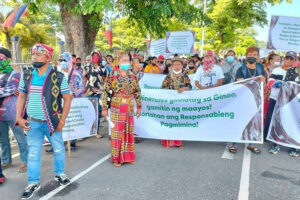COVID-19 vaccination reduces disease severity and transmission, saves lives

Misinformation and myths about coronavirus disease 2019 (COVID-19) and the vaccines developed against it have contributed to vaccine hesitancy, which refers to a delay in acceptance or refusal of available vaccines that have been deemed safe and effective by regulatory authorities.
False claims, when repeated, can later on be taken as truth and create clusters of people who do not want to get vaccinated, according to Gavi, the Vaccine Alliance.
This allows SARS-CoV-2 (the virus that causes COVID-19) to continue to circulate at high rates, allowing new variants to emerge and put the whole world at risk. The COVID-19 pandemic has given us a glimpse of what the world looks like without vaccination: walls were built in between regions, countries, families. Land, air, and sea movements were curtailed whether for business, health, education, or social reasons.
Since COVID-19 was declared a pandemic in March 2020 by the World Health Organization, more than 636 million people have been infected, with some of them having to combat long COVID symptoms of breathlessness, weakness, brain fog, fever, or the sense of hopelessness due to prolonged and unexplained illness.
More than 6.6 million people perished due to COVID-19. Vaccine hesitancy threatens to reverse progress made in tackling vaccine-preventable diseases.
VACCINES ARE SAFEIn the nearly three years since the onset of the pandemic, global multi-sectoral stakeholders led by scientists and regulatory agencies have been working to develop, manufacture and distribute vaccines and therapeutics to protect and save lives.
Today, more than 12 billion COVID-19 vaccines have been produced worldwide, facilitated by over 350 partnerships, voluntary licenses, and technology transfers that have resulted in more than 60% of the population at least partially vaccinated.
Together with other measures, safe and effective vaccines are an important tool to protect people against COVID-19, save lives and reduce widescale social disruption, according to the WHO.
The Joint Statement from the International Coalition of Medicines Regulatory Authorities and WHO issued early this year said that vaccination has been shown to contribute to reducing deaths and severe illness from COVID-19, and to reduce the transmission of COVID-19.
“Vaccinating as many people as possible and reducing the spread of disease is important,” the statement read, adding that vaccinating a significant proportion of the population also protects vulnerable people, such as those who cannot receive vaccines, or those who might remain at risk of infection after vaccination.
“Failure to vaccinate widely also enables continued circulation of the virus and the generation of variants, including some that may pose a greater risk. Widespread vaccination has contributed to fewer people getting sick and being hospitalized, ultimately alleviating the burden of COVID-19 on healthcare systems. It has also helped allow the move back to normal societal functioning and the reopening of economies,” continued the Joint Statement.
Getting vaccinated against COVID-19 provides many benefits. The US Centers for Disease Control and Prevention (CDC), among others, said that COVID-19 vaccines are safe and are effective at protecting people from getting seriously ill, being hospitalized, and even dying. Getting a COVID-19 vaccine is a safer, more reliable way to build protection than getting sick with COVID-19.
COVID-19 vaccination also helps protect individuals by creating an antibody response without you having to experience potentially severe illness or post-COVID conditions, the CDC said.
Vaccines can also keep children and teens from getting very sick if they do get COVID-19. This also means not missing classes and other activities.
Meanwhile, COVID-19 vaccines offer added protection to people who had COVID-19, including protection against being hospitalized from a new infection, especially as variants continue to emerge. As with vaccines for other diseases, people are protected best when they stay up to date with the recommended number of doses and boosters, when eligible.
Addressing vaccine hesitancy is crucial to securing global health security. The biopharmaceutical industry continues to fight against the pandemic by researching, developing, communicating around quality vaccines with demonstrated safety and efficacy profiles. Coordinated action is much more needed today to stem the tide of vaccine-preventable diseases, including COVID-19.
Teodoro B. Padilla is the executive director of the Pharmaceutical and Healthcare Association of the Philippines (PHAP), which represents the biopharmaceutical medicines and vaccines industry in the country. Its members are at the forefront of research and development efforts for COVID-19 and other diseases that affect Filipinos.




